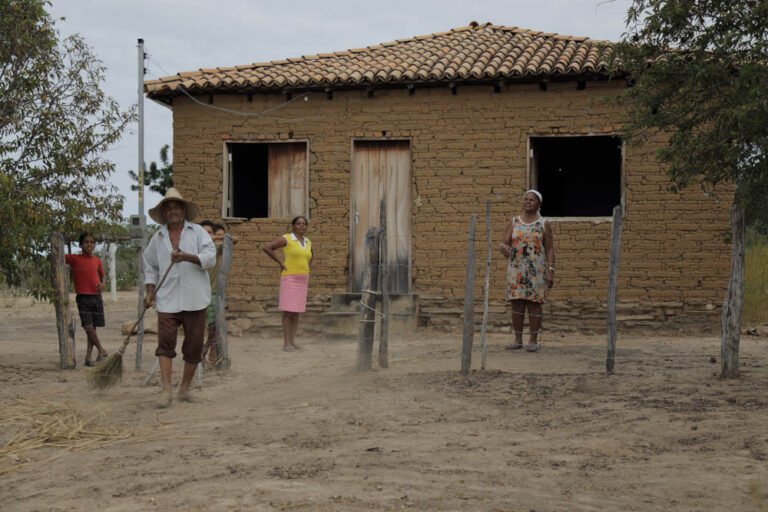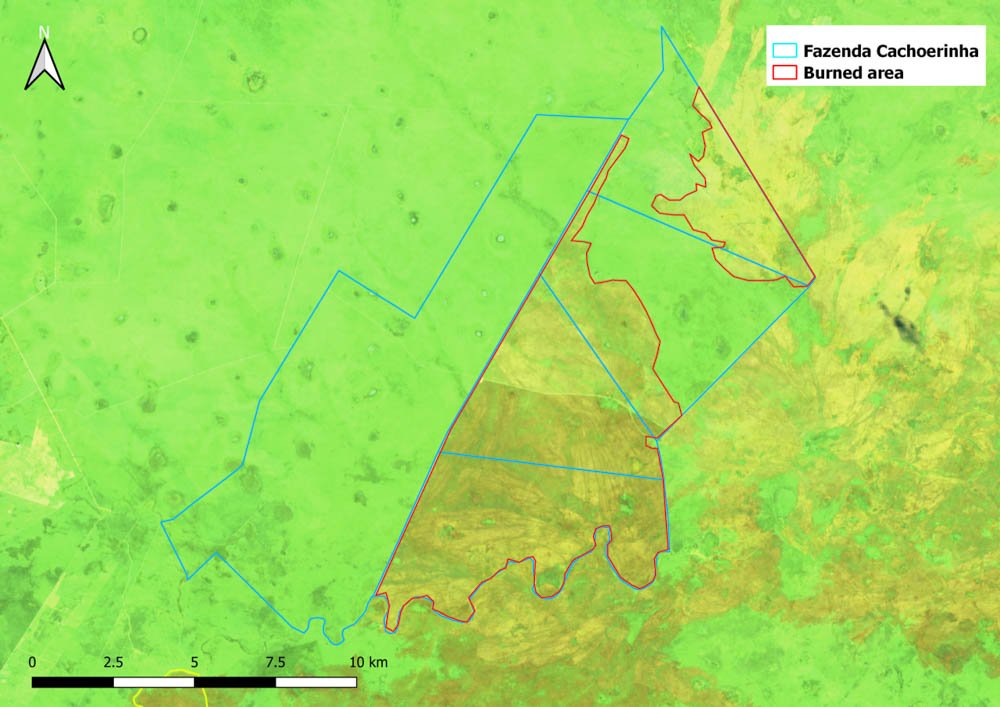







By Association of Lawyers and Rural Workers – AATR Bahia, Grain and Rede Social de Justiça e Direitos Humanos
The National Institute of Rural Settlement and Agrarian Reform (Incra), in a recent technical opinion, and the Court of Justice of Bahia (TJ-BA), in a ruling in October 2020, both recognized that two of the largest foreign holders of farmland in Brazil – the TIAA-CREF (Teachers Insurance and Annuity Association of America – College Retirement Equities Fund) pension funds[1] and Harvard University’s endowment fund (Harvard Management Co.) – illegally acquired hundreds of thousands of hectares of farmland in the Brazilian Cerrado. Details about the decisions recognizing the illegality of the land purchase, as well as an investigation into fires on the farms controlled by the funds, are in a new report[2] by the Association of Lawyers for Rural Workers in the State of Bahia (AATR), the Social Network for Justice and Human Rights (Rede Social), and GRAIN.
Since 2008, these funds have accumulated some 750,000 hectares in the country, through farmland deals involving illegal land grabs, violent evictions of traditional and rural communities, deforestation, wildfires, and other forms of social and environmental havoc in the region.[3] All this, moreover, by circumventing Brazilian laws that restrict the ownership of land by foreigners.[4]
Pension funds are set up with contributions from workers’ wages to official or supplemental social security, whether in the public or private sector. In general, they are specialized private financial companies representing unions, governments, or individuals to manage and invest those resources in order to seek the most profitable way to cover the payment of future pensions. In this case, the TIAA manages the contributions of American university professors and the Harvard University endowment of Harvard employees. The 2008 crisis and the zero or negative interest rates prevailing in central economies broadened the investment portfolios of pension funds and their investments into safer long-term assets, such as land and natural resources. Today these are the main sources of funds for land acquisition in the world. For more information see this text and animation.
AATR, Rede Social and GRAIN. TIAA and Harvard’s Brazilian farm deals judged ilegal, Dec. 17, 2020.
The Rede Social, AATR, GRAIN and other organizations have produced several research reports documenting these processes. See at: Rede Social; AATR; Campanha Stoplandgrabs.
The TIAA’s and Harvard’s strategies to circumvent legal limits on land ownership by foreigners have been monitored and denounced in reports by the Rede Social and GRAIN.
In May 2019, Incra issued an opinion[5] on the issue, detailing how all the land obtained by TIAA after 2010 has been acquired in breach of Federal Law No. 5,709/1971[6] and of the understanding established by Opinion LA-01, issued by the Federal Solicitor General (AGU) in 2010, which also restricts the acquisition and leasing of agricultural land by companies registered in Brazil but actually under the control of foreign companies. According to INCRA, TIAA’s land purchases carried out through the Brazilian company Radar Propriedades Agrícolas and other Brazilian subsidiaries should be considered null and void because, although these companies are registered in the country, most of their stock is held by foreign companies. The affiliated companies were classified as part of the same “economic group”, amounting to a financial architecture designed to mask the real control wielded by the TIAA-CREF fund. As a result, the Incra division responsible for the supervision and oversight of land acquisitions by foreign entities recommended the annulment of the deeds of all the farms acquired through TIAA subsidiaries since 2010, covering more than 150,000 ha.
In addition, Incra found that TIAA’s land acquisitions were based on land-grabbing schemes commonly used in the region, through the illegal takeover of public lands and a subsequent fraudulent claim to their legal ownership. The Institute stated that this was an additional reason for the annulment of TIAA’s land deeds.
The federal rural land authority has not yet conducted an evaluation of Harvard’s land acquisitions, which were carried out in a similar manner. However, on October 6, 2020, the Bahia Court of Justice issued a ruling[7] that blocked the land deed for one of Harvard’s largest farmland acquisitions in Brazil – a 107,000-hectare agglomeration of land known as the Campo Largo tract (or Gleba), in the municipality of Cotegipe, in the western region of the state. The court also reopened an investigation into Harvard’s acquisition of lands in the Campo Largo tract, based on evidence provided by the State of Bahia’s General Prosecutor’s Office (PGE) that it is public land that had been illegally transferred to private ownership.
Harvard has been trying to sell the Caracol Agropecuária properties and its other Brazilian farms in the face of mounting criticism and protests from the institution’s own students. Unable to find a buyer, it decided to spin off[8] its farmland division to an independent, privately held company called SolumPartners and bring in the insurance group AIG as a partner. Although it is not clear exactly which farmlands were transferred to Solum and which remain under Harvard’s management, the University is still liable for the fires and land conflicts generated by its farmland purchases in Brazil. As recognized by INCRA’s opinion on the TIAA case, under Brazilian law, the lands are still held to be under the control of the same “economic group.”
Essentially, Law 5.709/71 requires: a size limit of 50 modules for any kind of land use in a continuous or discontinuous area (art. 3); the listing of agricultural, livestock, and industrial projects linked to the business objectives as set forth in the by-laws and approved by the Ministry of Agrarian Development (art. 5); communication of each property’s registration to INCRA, to the State Courts of Justice, and to the Ministry of Agrarian Development (art. 9-11); a maximum extension of 25% of the surface area of the municipality, considering the sum of all rural areas belonging to foreign companies or controlled by foreigners, limited to 40% for each nationality (art. 12 and §1).
In Mansidão, the farms acquired are located in the region known as Baixões, where approximately 400 squatter families in ten traditional communities on collectively farmed lands, have been harmed by deforestation and fires


In Mansidão, the farms acquired are located in the region known as Baixões, where approximately 400 squatter families in ten traditional communities on collectively farmed lands, have been harmed by deforestation and fires.






In the Campo Largo tract, in the municipality of Cotegipe, the 240 squatter families that were violently evicted after the sale to the Harvard endowment are still in the area and hope to return to their land, which continues to be degraded by burning and deforestation.
It is well known that the cycle of fire is closely associated with the cycle of land grabbing and deforestation, as a way to conceal encroachments on public lands and environmental crimes. In this case, Bahia’s Institute of Environment and Water Resources (INEMA) recently granted a controversial authorization[10] for Caracol Agropecuária S/A to suppress 5,212 hectares of native vegetation, valid for 4 years, on a group of farms in the Campo Largo tract. The two farms where the fires were set are not included in that authorization, indicating that the fires were possibly set to cover up illegal deforestation by Caracol. The situation is equally catastrophic on one of Harvard’s other nearby farms, in the neighboring state of Piauí. At the Coelho farm, a massive fire destroyed a large swath of forest area on the property, burning more than 8,600 hectares within the property boundaries and 11,000 hectares all told. Both the Campo Largo tract and the Coelho Farm were acquired by Harvard through its Brazilian subsidiary Caracol Agropecuária.
INEMA Ordinance (Portaria) No. 19,388 of October 22, 2019. A recent preliminary injunction issued by federal judge Ávio Mozar, of the 12th Federal Court of Bahia, overturned State Decree 15.682/2014, which had created a new loophole to exempt agroforestry activities from environmental licensing in Bahia, and suspended all current environmental licenses.
This year AidEnvironment also reported large fires on TIAA’s farms in the Cerrado region. In early October 2020, fires destroyed the forest reserve areas of TIAA’s farms in Santa Filomena, Piauí, turning about 1,360 hectares into ashes. In the same municipality, the fund controls, through Tellus Brasil Participações S/A, 4,500 hectares of the Ludmila and Laranjeiras farms, acquired from the family of a notorious land grabber active in the region[11], which have been broken down into several smaller holdings since 2016, whose names were changed to what is now called the Frutal Condominium.
Further information here: Juiz bloqueia de 124 mil hectares de terras de Euclides de Carli. G1 Piauí, July 22, 2016.


These farms are located in the extreme northwest of the plateau called “Chapada Até Que Enfim”, near the riverside communities of Baixão Fechado, Salto, and the indigenous community of the Gamela people, Morro D’Água. According to reports from the communities, recurring deforestation and fires have changed rainfall patterns, thus reducing wetlands, springs and river flows, in addition to causing erosion and greater turbidity in water bodies.


The Federal Prosecutor’s Office (MPF) has had a civil inquiry [12], underway since 2016 to investigate allegations of environmental crimes, illegal land acquisition, and damage to rural communities around the farms controlled by the Radar Group in Maranhão, but so far no accusations have been filed against the companies and/or their agents.
In this scenario, it is possible to conclude that deforestation and burning, whether illegal or authorized by environmental agencies through flimsy vetting procedures and document analyses, are the primary means used to consolidate land grabs, with the effective takeover of farms with native plant cover at the time of their acquisition, thereby hiking their market prices and intensifying real estate speculation, prior to the land’s conversion to grain production.
Inquérito Civil MPF n° 1.19.005.000183/2016-61
Association of Lawyers and Rural Workers – AATR Bahia
GRAIN
Rede Social de Justiça e Direitos Humanos